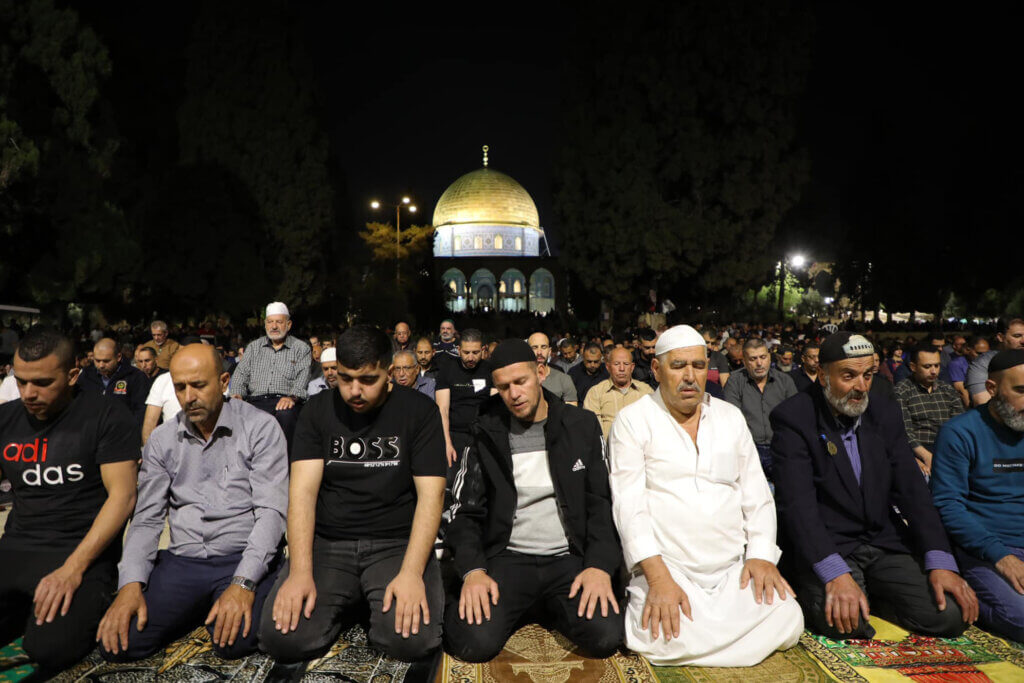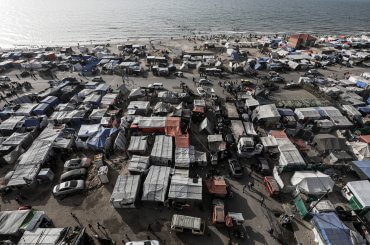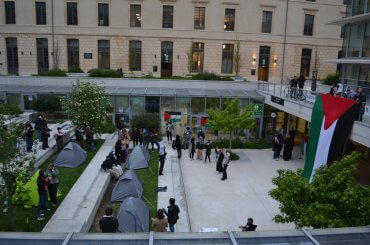The al-Aqsa Mosque compound, which lies in the heart of occupied East Jerusalem and is one of Islam’s holiest sites, is typically bustling with worshippers from Palestine and around the world. In Ramadan and the days leading up to the Muslim holy month, the compound practically spills over with people.
But this year, the Muslim Holy site, also known as al-Haram al-Sharif, or the Noble Sanctuary, has perhaps never been this empty of worshippers in decades, if not centuries.
Since October 7, Israel has imposed near blanket restrictions on the entry of Palestinians to the al-Aqsa Mosque in occupied East Jerusalem, denying access to hundreds of thousands of Muslim worshipers to the Holy Site.
Israeli police barricades have prevented hundreds of thousands of Palestinians from both sides of the armistice lines from reaching the Old City and the al-Aqsa Mosque. For months, Friday prayers at the Mosque, which typically attract thousands of worshipers, have seen scant numbers, as many Palestinians have been forced to pray in the streets around the compound due to Israeli authorities’ refusal to allow Palestinians into the Mosque.
“Ramadan is a month of worshipping, but the Israeli occupation instigates trouble every year,” the former Grand Mufti of Jerusalem, Ekrema Sabri, 85, said.
“Why do the occupation authorities make problems every Ramadan?” Sabri continued. “Because they don’t want to see so many Muslim worshipers at the Al-Aqsa. If they [Israel] stay away [from the Mosque]. it will be peaceful even if a million worshipers come”.
Now, with the holy month of Ramadan fast approaching and prospects of a ceasefire still far away, promises from Israeli officials to double down on restrictions at al-Aqsa threaten to escalate tensions even further across the occupied Palestinian territory.
Itamar Ben-Gvir, Israel’s national security minister, has, in recent weeks, doubled down on his demands to drastically limit the number of Muslim worshipers at the site, including limitations on Palestinian citizens of Israel, and residents of the occupied West Bank and East Jerusalem.
On Tuesday, Israeli Prime Minister Benjamin Netanyahu seemed to rebuff Ben-Gvir’s demands, stating that Israel will not reduce the number of worshipers allowed to pray at the al-Aqsa Mosque “in the first week of Ramadan from the levels in previous years,” and that “situational assessments around security and safety” will be made from week to week throughout the holy month, Israeli media reported.
But while Netanyahu has assured that “the sanctity of the holiday will be preserved this year, as it is every year,” Israeli police are actively summoning young men from occupied East Jerusalem, instructing them to stay clear of the compound ahead of Ramadan, which is expected to begin on March 10.
“You are not to get near the al-Aqsa Gates during the month,” Israel’s police told 21-year-old Muhammad Hasan in mid-February at the al-Qishleh police station near Jaffa Gate.
Like many young Palestinian men in East Jerusalem, Hasan, a resident of the Jabal al-Mukabbir neighborhood, has been intermittently barred from entering the al-Aqsa Mosque since 2022. Last Ramadan, he was briefly detained for refusing Israeli police orders to vacate the al-Aqsa Mosque following the conclusion of evening prayers.
Wasim Obeidat, another resident of Jabal al-Mukabbir, was also summoned to the al-Qishleh police station on February 27 to sign a commitment not to enter the Mosque during the Holy month. The 20-year-old was issued a 6-month ban last year for refusing police orders to leave the Mosque after the conclusion of prayers.
“They try to empty the al-Aqsa of its people. They want to stop us from praying there,” Obeidat said.
Ben-Gvir seeks tighter restrictions despite intelligence warnings
For weeks leading up to Ramadan, far-right settler Itamar Ben-Gvir, who oversees the police in his capacity as National Security Minister, was lobbying to impose heavy-handed blanket restrictions on Palestinians from entering Jerusalem and the al-Aqsa Mosque compound.
In February, Ben-Gvir proposed banning Palestinians from the West Bank from entering Jerusalem and the Mosque completely, while only allowing entry for Palestinian citizens of Israel aged 70 and above. While Palestinian citizens of Israel do not typically require Israeli permits to enter Jerusalem and its holy sites, Palestinians with West Bank IDs must receive Israeli approval if they seek to enter Israel or occupied Jerusalem, year-round.
In recent days, several Hebrew media outlets reported that the Israel Police recommended permitting entry of Palestinians from the West Bank aged 60 and up, and “Israeli Arabs” aged 45 and above. In contrast, Israel’s Security Agency, the Shin Bet, warned that imposing any restrictions on Israeli citizens or residents from Jerusalem from praying at al-Aqsa could trigger violence.
And while Israel maintains that it does not impede Palestinians’ right to worship at their holy places, Israeli police maintain a permanent presence around the Old City and at the gates of the Mosque, where they routinely subject Palestinians to arbitrary stops and searches. Israeli police stationed at the gates of the Mosque occasionally ban, at their discretion, Palestinians from entering.
Palestinians routinely barred from holy site
In what is widely regarded as a matter of Israeli policy in Jerusalem, Israel routinely bans Palestinian activists or those who raise a voice against the occupation from entering the Mosque.
Ahmad Safadi, 52, a resident of the Old City whose home is only a few meters from Bab al-Ghawanmeh — one of the more heavily policed gates on the northern edge of the compound — said that Israeli police have been preventing him from going inside the Mosque grounds for years as punishment for his activism.
A political commentator who is a regular on TV channels affiliated with countries from the “axis of resistance,” such as al-Mayadeen, Safadi first began having trouble accessing the holy site following the Israeli “Flag March” in May 2022. At the time, he was monitoring the situation from inside the Haram al-Sharif, or Noble Sanctuary, another term used to refer to the al-Aqsa Mosque compound, when he says Israeli police assaulted him and forcefully removed him from the grounds.
The Flag March is a state-sponsored annual parade on the so-called “Jerusalem Day,” where tens of thousands of Jewish fanatics, mainly youth, march across Jerusalem and inside the walls of the Old City, chanting “death to the Arabs” and “Nakba is on the way,” escorted by the police and showered with governmental praise. While Jewish demonstrators are rarely apprehended for their verbal and physical assaults on Palestinians during the march, Israeli officials impose widespread closures on Palestinian shops and restrictions on Palestinian residents.
Safadi suspects he is being tracked by smart cameras, which alert police officers at the gates of the Mosque of his presence.
“I’m not allowed to enter the Al-Aqsa even at the times when there are no settlers visiting]. The police have distributed my photo at all entrances [of the Mosque],” he said.
With Israel’s intense restrictions on Palestinian movement and access to holy sites in Jerusalem, Safadi accuses the Israeli security apparatus of fomenting the very conditions that they say they’re trying to thwart.
“Israel must address the causes of [Operation] al-Aqsa Flood: the violations inside al-Aqsa,” Safadi remarked, referring to Hamas’s offensive on October 7 of last year. “The battle in Gaza reflects on al-Quds [Jerusalem],” he added.
A history of Israeli violations at the site
Former Grand Mufti Sheikh Ekrema Sabri lambasted Israel for violating the rights of worshipers at the site, and for what he says is a years-long effort by the state to change the Muslim nature of the holy site.
“No country in the world conditions entry to the holy places on age. Only the occupation authorities specify age as a requirement for entry, and this practice carries a lot of injustice and has deprived hundreds of thousands of Muslims from praying at the al-Aqsa”, Sheikh Sabri told Mondoweiss.
Sabri, a leading religious figure in Palestine, has repeatedly maintained that the al-Aqsa Mosque is exclusively Muslim, opposing Jewish claims over the site. In recent years a growing movement of Jewish religious fanatics, with the help of far-right officials like Ben-Gvir, have been attempting to establish facts on the ground, by increasing Jewish visitation and worship at the site, which Jews refer to as the ‘Temple Mount’.
Those efforts have been coupled with a crackdown on critics like Sheikh Sabri. Currently, the Israeli government is considering filing ‘incitement to terrorism’ charges against the former Mufti following pressure from right-wing Jewish groups. Last July, the Israeli government issued the vocal cleric a 6-month travel ban, only to renew it for another six months the following December.
“On this occasion, I call on the Islamic world to remember al-Aqsa during this blessed month of Ramadan and the responsibility they bear towards it and the responsibility to end the Israeli occupation within the confines of international law,” Sabri said.
Sabri is a member of the 24-person Al-Awqaf Council, appointed by the Jordanian government, which serves as the authority overseeing the management of the al-Aqsa Mosque, as per decades-old treaties signed between Israel and Jordan.
On Monday, Knesset members Ayman Odeh, Ahmed Tibi, and Yosef Al-Etawana met with the King of Jordan in Amman to highlight growing tensions in Jerusalem and the al-Aqsa Mosque, following Ben Gvir’s statements on limiting the numbers of worshipers in the site. The Arab Knesset members urged King Abdullah to act to preserve the freedom of worship at the Muslim site, appealing to the role of Jordan as the custodian of holy places in occupied East Jerusalem.
However, Jordan’s custodianship over the site is largely symbolic, with the primary modes of control and power over the site lying in the hands of Israeli authorities.
The Al-Awqaf Council’s ability to exercise effective jurisdiction over the Mosque has been challenged in the past decade by the Israeli government and, one would argue, significantly curtailed.
Israel’s police and the Israeli Antiquity Authority routinely interfere in the carrying out of maintenance work in the compound and attempts to change the status quo, the Al-Awqaf Council often charges.
Over the years, several incidents led to confrontations between Palestinians and the Israeli authorities, highlighting both the considerable sensitivity of the site and the efforts made by Israel to exert more control over it.
In 2021, Israel and Hamas fought an 11-day war over Israeli provocations at al-Aqsa, and settler attempts to take over Palestinian homes in Sheikh Jarrah.
In a famous incident in 2017, an employee of the Israeli Antiquity Authority was caught trying to remove a stone from a pillar in an underground section of the al-Qibli mosque. The incident triggered a verbal confrontation between the Palestinian guards employed by the Council and the Israeli police, who ended up arresting six Awqaf guards.
In the summer of the same year, the Israeli police attempted to install surveillance equipment, metal detectors and other barriers to free movement at the entrances of the compound, after Palestinian gunmen killed two Israeli police officers stationed at one of the compound gates. The Israeli measures resulted in a two-week standoff between the police and Palestinians in the city who embarked on a campaign of civil disobedience, gathering in their thousands outside the Mosque in protest, demanding the removal of the metal gates.
Israel’s meddling with the al-Aqsa affairs isn’t new either, but it has becoming more brazen by the day. Immediately following the 1967 war, Israel seized control of one of the entrances to the compound known as the Moroccan gate, permitting only Jewish visitors to use it, marking the first infraction. In the subsequent decades, outside interference only escalated.
Today, the al-Awqaf Council has a hard time completing even the most minor necessary maintenance on the site due to the police and the Israel Antiquities Authority’s interference. Staff, including chief engineers, have been detained while working on the site over the years.
Now, the ongoing war in Gaza has only fueled attempts to exert more control on the holy site.
“The occupation wants to exert sovereignty and now [the war] is an opportunity to do so,”’ Sabri said.



Since they want it ALL, including one of the most sacred places of worship in Islam, they will try all their tricks in their zionist books, to achieve it. They have shown nothing but disrespect for other religions, including storming the Mosque, desecrating it, attacking worshippers, their terrorist leaders making provocative visits to the place, and lately we have seen them bomb historical Churches and Mosques in Gaza, showing nothing but disdain for these religions. Do they sound like civilized and decent human beings?
The question is, if Hamas had bombed synagogues, would the whining squads and the apologists, be quiet about it?